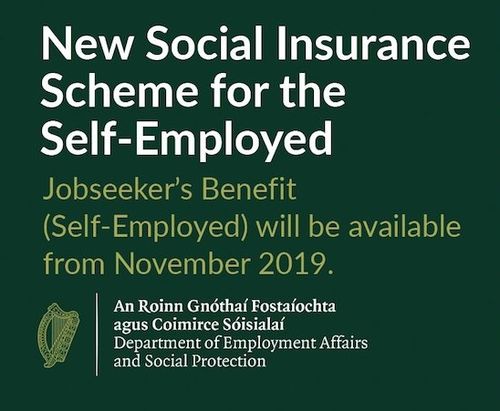The Programme for Partnership Government (2016) gave a commitment to extend Jobseeker’s Benefit to the self-employed, with Budget 2019 introducing a new Jobseeker’s Benefit (Self-Employed) (JBSE) from 1 November 2019, as provided for in the Social Welfare Act 2019.
The purpose of this new scheme is to offer income support to self-employed people who are no longer engaged in self-employment and who have paid a specific number of Class S PRSI self-employment contributions.
The scheme is not a voluntary or compulsory scheme but rather an extension of social insurance coverage for “S” class contributors with the cost funded by the Social Insurance Fund (SIF).
History
Prior to the implementation of the JBSE scheme, self-employed people who ceased self-employment could not access a Jobseekers Benefit payment because they were paying a class S PRSI contribution – standard Jobseekers Benefit (JB) is only available to employees paying a class A, H or P social insurance contribution.
While formerly self-employed people could apply for a Jobseekers Allowance payment instead of a Jobseekers Benefit payment, access to Jobseekers Allowance (JA) is means tested and would therefore take into consideration savings, investments, property (other than their own home) and their partners/spouses income from employment or self-employment. This would often result in the person failing the means test and not being eligible for a Jobseekers Allowance payment.
With this new scheme, the formerly self-employed person may now qualify for a non-means tested payment based on their class “S” social insurance payments – without consideration of means, with the weekly rate of payment linked to their graduated earnings in the relevant tax year.
Ceasing Self-Employment
Persons seeking to claim JBSE will not be required to deregister their business with Revenue in order to qualify for the payment. This is in large part due to the amount of time de-registration takes and to avoid any unnecessary delay where a potential re-start of self-employment could occur in the future.
The DEASP reserves the right to fully investigate applications and randomly, or periodically, review claims for JBSE and request information, material and documentation to confirm that the claimant has fully ceased self-employment and that they have not been trading or using any equipment, materials, premises or business accounts for self-employment purposes during the period of the JBSE claim.
Disqualification
You may be disqualified from getting JBSE for 9 weeks if you have received moneys from the sale or disposal of your business in excess of an amount set by the DEASP.
Qualifying Conditions
To qualify for Jobseeker's Benefit (Self-Employed) you must:
- Be aged between 18 and 66.
- No longer be self-employed. You must have lost your self-employment involuntarily and not because of a temporary shutdown or seasonal closure.
- Be unemployed (you can work as an employee for up to 3 days each week).
- Be capable of work.
- Be available for and genuinely seeking full-time work.
- Have enough social insurance (PRSI) contributions.
Record of Mutual Commitment
You will be required, as part of the application process, to sign a Record of Mutual Commitment which includes an undertaking to:
- attend meetings to which you are invited by the Department;
- follow up all suggestions and take up any work placement, work experience and/or training/personal development places notified by the Department;
- inform the Department immediately if you find work, or if you are no longer available for work.
No Self-employment
One of the main significant differences between the new JBSE scheme and the existing Jobseekers Benefit is that the claimant must stop all self-employment activity.
At present, a person in receipt of a standard Jobseekers Benefit (JB) claim can engage in self-employment while in receipt of a JB claim. A person in receipt of Jobseeker’s Benefit Self Employed (JBSE) cannot engage in any self-employment while in receipt of the JBSE.
This not only applies to the previous self-employment the person was engaged in, but also includes engaging in any new form of self-employment while in recipe of the JBSE payment.
Combining Social Insurance Classes
Where a person has previously been both self-employed (paying class S PRSI) and an employee (paying class A PRSI) the two classes of PRSI cannot be combined to qualify for JBSE.
Working and JBSE
While a person on JBSE cannot engage in self-employment, they can work as an employee for up to 3 days each week and get Jobseeker's Benefit (Self-Employed).
Penalty rates
Your Jobseeker's Benefit (Self-Employed) payment can be reduced if you refuse or fail to attend meetings requested by the DEASP or if you refuse or fail to participate in an appropriate employment support scheme, work experience or training.
Getting paid
Jobseeker’s Benefit (Self-Employed) can be paid directly into your account with a financial institution or you can collect your payment weekly from your nearest post office.
